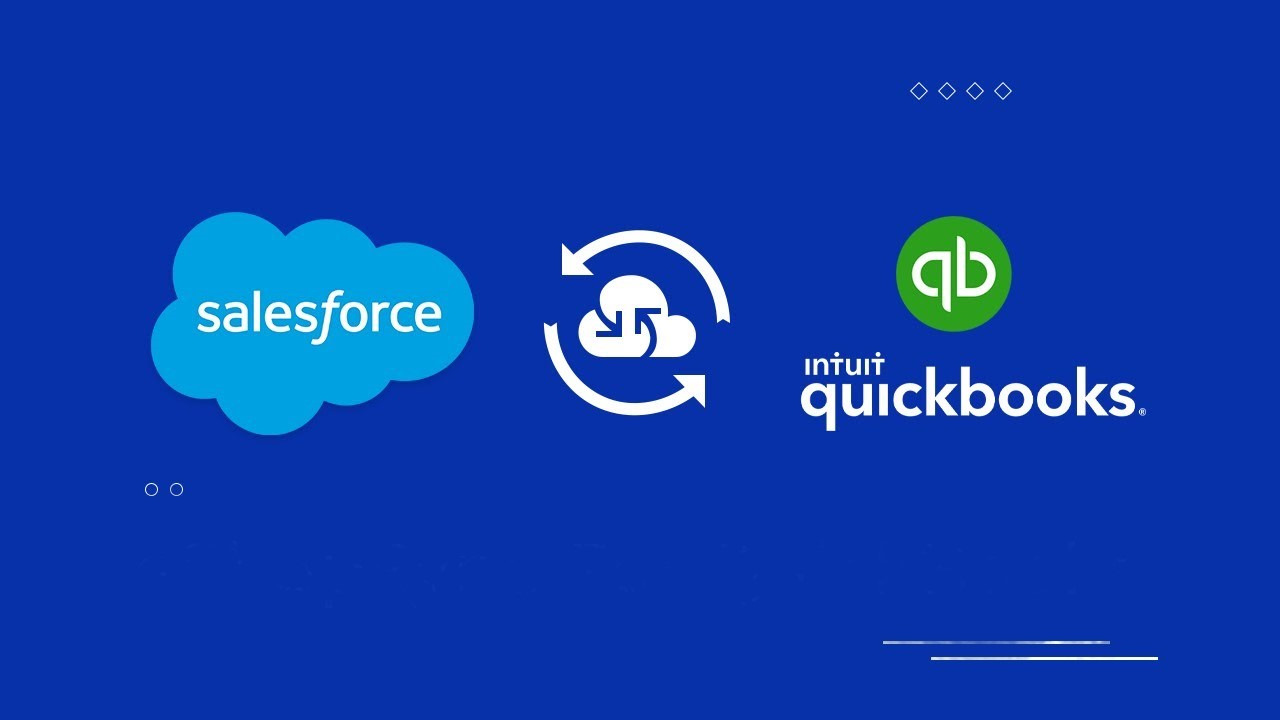How Salesforce QuickBooks Integration helps Businesses in Data Synchronization?

Managing finances can be cumbersome for a business operation manager or personnel. To ease out the process of managing accounting data, businesses can integrate accounting applications into their business ecosystem.
But do you actually think that just managing accounting data is enough? Businesses need to look beyond accounting applications and think about avenues that can help them in extracting much out of this accounting information with Salesforce QuickBooks Integration.
Salesforce and QuickBooks have been one of the most popular cloud computing software managing customer and accounting information respectively.
From small-scale business to enterprises, QuickBooks has been the most preferred online accounting software to track sales, create and send invoices, and know-how your business is doing at any time.
On the other hand, Salesforce CRM moves deals faster by tracking customer information and interactions in one place.
But still, businesses don’t have much idea about integrating Salesforce and QuickBooks together. Data Synchronization can help your business in syncing data from QuickBooks to Salesforce but still many of you must be integrating data manually consuming your time and efforts.
The manual way of data integration seems tedious and time-consuming as it can lead to data duplicity and synchronization errors while integrating data from QuickBooks to Salesforce.
Why you should consider Salesforce and QuickBooks Integration?
For Accounting businesses, Salesforce and QuickBooks Integration not only help in data synchronization but it will also help in converting opportunities into leads within Salesforce CRM.
It helps in automating business processes, improved productivity, and optimized manual data integration to save business incurring cost and time.
When you integrate Salesforce CRM with your accounting software, you can easily import and sync data, customer’s information from QuickBooks to Salesforce to achieve overall business visibility within Salesforce CRM.
Key Activities which you can achieve when you integrate Salesforce and QuickBooks together are:
- Synchronize QuickBooks accounting data at Salesforce CRM end to avail CRM benefits
- Synchronization of Categories from QuickBooks to Salesforce
- Customers synchronization as Accounts and Contacts at Salesforce end
- Orders and Products synchronization to manage products and Inventory
- Provides unified Salesforce platform to manage both QuickBooks and CRM data
- Salesforce Centric configuration concept to avail hassle-free environment
- Users concept to track placed Orders and their info
- Interactive design with the user interface at Salesforce end adding on effective data utilization
How to integrate Salesforce and QuickBooks together?
Salesforce and QuickBooks Integration can ensure business data consistency and integrity. With real-time and bidirectional data sync, you need not wait for long hours to sync data from QuickBooks to Salesforce and vice-versa.
But what are some of the different ways to integrate Salesforce and QuickBooks together?
Custom Integration:
Intuit, the company that owns QuickBooks, has released its own SDK, a collection of protocols for integration. This can be used to create a custom solution to integrate your products.
Customization would obviously cost more as you would have to hire dedicated Salesforce developers. This way is most useful for those who are heavily dependent on Salesforce and QuickBooks and have many fields to sync.
Third-Party Integrations:
There are several third-party applications also popularly known as QuickBooks connector that helps in integrating QuickBooks and Salesforce together to sync data thereby providing a single shared view of data without the need to switch between these two platforms.
You can explore more about these third-party applications from Salesforce AppExchange, which acts as a repository for third-party applications for Salesforce integrated products.
You can find numerous applications on AppExchange integrating Salesforce and QuickBooks together, some of the popular applications which you can explore are eShopSync for QuickBooks, DBSync, Workato, and Zapier.
These are some of the popular applications when it comes to integrating Salesforce and QuickBooks together. But here’s a pro tip, if you are looking out for an application you must look forward to your business ecosystem before you go ahead to purchase the paid version of the application.
To ensure this, you must always explore the free-trial versions, which gives you an environment to try out the application first-hand before making your final choice.
What are the benefits of integrating Salesforce and QuickBooks together?
Integrating Quickbooks and Salesforce not only helps businesses to sync and import data from Quickbooks to Salesforce, but there is much more which you can achieve from Salesforce QuickBooks Integration:
Benefits of Salesforce and QuickBooks Integration are:
- Helps in optimizing integration time as the data flow is bidirectional
- Your in-house sales team accesses an in-depth analysis of the sales pattern within Salesforce.
- You can also go through the balance sheet and can also check for open balances and credit limits from within Salesforce.
- It will also help in tracking each and every customer information and history in detail with the help of Salesforce.
- With the help of Salesforce, you can easily analyze sales histories for each prospect or customer.
- Helps in Reducing Redundant Data Errors
Conclusion:
Data Synchronization via Salesforce QuickBooks Integration allows you to access data from these two distinguished platforms in a single shared view so that you don’t have to switch between applications to access data.
So, data synchronization is a must for business as they not only can access data from one single point of view but they can also access data within Salesforce CRM which helps them in converting opportunities and estimates into leads taking business revenues to a new high.
With this exploration guide on Salesforce QuickBooks Integration, you are now all set to take your business to the next level.




